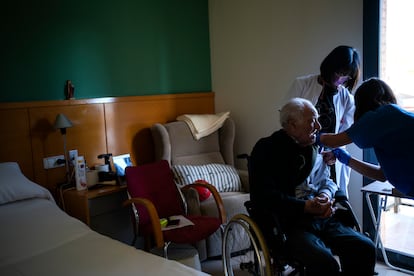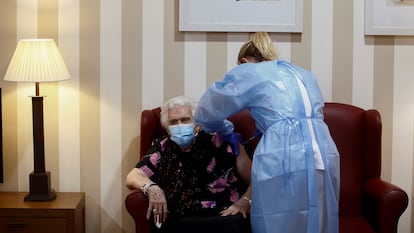Spain approaches end of phase 1 of Covid vaccination campaign
The process of immunizing seniors in residences is nearly complete, while the majority of healthcare workers have got their first dose

Spain’s Covid-19 vaccination campaign is entering the final stages of the process of immunizing residents of senior residences, while the majority of healthcare workers have also received their first jab – many have also got the second. Meanwhile, the final part of this first phase, inoculating adults with need for daily assistance even if they are not in residential care, has begun in the Canary Islands, Murcia and Navarre. This process is expected to get going in the rest of the country before the middle of February.
EL PAÍS has collected statistics in an attempt to take a snapshot of where the vaccination process has got to in Spain and these are the principal conclusions. Despite a year having passed since the first coronavirus infections having been detected in the country, the system for collecting data on the health crisis is still deficient. The Health Ministry has not centralized the collection of information on the vaccination process and just 11 of the country’s 17 autonomous regions have supplied sufficiently detailed figures.
The AstraZeneca vaccines, which will start arriving in Spain this week, will only be given to people aged between 18 and 55
The process is both complex and flexible. The first three groups in phase 1 of the campaign overlap in order to optimize the process, and so that it continues without pause. Healthcare workers started receiving the vaccine before the process finished in senior residences, and adults with need for daily assistance will start being immunized before all healthcare staff have had their doses.
Along the same lines, some regions are already planning for the over-80s – who are the first group in phase 2 – to start the process before phase 1 has finished. There are around 380,000 adults with need for daily assistance, and they are a complicated group to vaccinate given that home visits are often needed. It could be more efficient to vaccinate non-dependent seniors at the same time – this group is made up of 2.8 million people and accounts for six in every 10 Covid deaths in Spain. In January of this year, more than 1,300 people over the age of 80 died every week with the disease.
To complicate the situation further, not all of the approved vaccines are going to be administered to everyone. The AstraZeneca vaccines, which will start arriving in Spain this week, will only be given to people aged between 18 and 55, given that this is the group where clinical trials have proved it to be effective. For now, the Health Ministry has decided that it will be used to immunize healthcare workers who are not on the front line, and next week a decision will be made on which section of the population to prioritize – it could be essential workers or young people with underlying health conditions.

This, in effect, is what some regions are already doing. It is not completely clear which healthcare workers are being immunized in phase 1, and in many cases, the authorities have opted to give all staff in hospitals their doses, independently of their role. In Madrid, for example, a higher percentage of healthcare workers have received the second dose of the vaccine than among seniors who live in residences. This is despite the fact that senior residences – where more than half of official Covid deaths took place in Spain, according to the Health Ministry’s figures – were the absolute priority of the central government’s vaccination plan.
That said, the available data suggests that immunity is not far off for residents of the country’s senior residences. With the information supplied by the regions, nearly all residents and staff have got their first dose, and the majority of regions have administered the second dose to more than half of the recipients.
The process in residences is being delayed due to outbreaks in some of these centers. According to regional health departments consulted by EL PAÍS, this is not presenting a problem given that the process is simply being postponed where there is a high number of people infected.
The latest data from the Health Ministry shows that all regions have administered more than 70% of the doses that they have received
Data supplied last week by the Catalan regional authorities show that the vaccines are starting to have an effect, and that number of new infections is rising less inside such residences compared to outside. Fernando Simón, the director of the Health Ministry’s Coordination Center for Health Alerts (CCAES), also said on Thursday that outbreaks in these centers are falling and that comparisons made by the ministry between the over-65s who live in residences and those who do not show a lower infection rate among the former.
The full protection offered by the vaccines, however, does not arrive until a week after the second dose. With the extreme levels of transmission that are currently being seen in Spain – the 14-day cumulative number of coronavirus cases per 100,000 inhabitants is around 750 – it is no surprise that the virus is finding its way into senior residences during this process, infecting inhabitants, and even claiming the lives of those who have been inoculated. The risk after the first shot is low, but it still exists.
The latest data from the Health Ministry shows that all regions have administered more than 70% of the doses that they have received. The authorities insist that the problem now will not be the capacity to deliver the vaccines, but rather the number that Spain will receive. From this weekend onward, that number will rise, with, for example, AstraZeneca sending 1.8 million doses this month. And it will go up even more in March, which is when a new vaccine – from Janssen – may be added to the list. The vaccination process for adults with need for daily assistance even if they are not in residential care will be a good means to measure the agility of the system.
With reporting by María Sosa, Isabel Valdés and Lucía Bohórquez.
English version by Simon Hunter.
Vaccinations by region
Andalusia. 99% of the first dose and 81% of the second, in residences. Among healthcare workers, 79% have received their first dose; the figure rises to 83% for frontline healthcare workers. A total of 23,165 have received the second, but the region has not supplied the percentage of the total that this represents. This data is from last Monday.
Catalonia. In residences, 85.9% have got the first dose, and 55.9% the second. The region has not supplied data for healthcare workers. This data is from Thursday.
Madrid. The majority of seniors in residences and healthcare workers have got their first dose. The second dose has been given to 37.5% of the former, and 38.1% of the latter.
Valencia. No data supplied.
Castilla y León. No data supplied.
Basque Country. No data supplied.
Canary Islands. Last week the second dose was administered to seniors in residences, while 90% of healthcare workers have got their first dose. Some islands have started with adults with need for daily assistance even if they are not in residential care, and this process will begin in the remainder from today.
Castilla-La Mancha. All frontline healthcare staff have been vaccinated, while 97% of residents in senior homes have got their first dose.
Murcia. Most senior homes have finished the vaccination process, with those who missed their jab for whatever reason (an outbreak, logistical issues…) still being vaccinated. Healthcare workers are currently receiving their second dose. Adults with need for assistance who attend day centers are currently being vaccinated. The process of administering the first dose in these centers is due to finish this week.
Aragón. More than 90% of the first dose has been administered in senior homes and between 50% and 81% have got the second, depending on the area. More than 6,000 healthcare workers have been vaccinated as well as 1,300 vulnerable people from other groups (adults who need assistance or seniors).
Balearic Islands. The second dose has been administered in 60% of residences. Among healthcare workers, nearly all have had their first injection and the second is being administered right now.
Extremadura. In homes and among healthcare workers, 90% have received the first dose. Adults who need daily assistance will begin receiving theirs on February 15.
Asturias. No data supplied.
La Rioja. The vaccination process is due to finish in mid-February in senior homes and frontline healthcare workers.
Navarre. More than 50% of senior home residents have had their second dose, and 50% of healthcare workers have had their first. Among adults with need for daily assistance even if they are not in residential care, 34% have had their first dose, according to data supplied on Wednesday.
Cantabria. No percentages for each group have been supplied.
Tu suscripción se está usando en otro dispositivo
¿Quieres añadir otro usuario a tu suscripción?
Si continúas leyendo en este dispositivo, no se podrá leer en el otro.
FlechaTu suscripción se está usando en otro dispositivo y solo puedes acceder a EL PAÍS desde un dispositivo a la vez.
Si quieres compartir tu cuenta, cambia tu suscripción a la modalidad Premium, así podrás añadir otro usuario. Cada uno accederá con su propia cuenta de email, lo que os permitirá personalizar vuestra experiencia en EL PAÍS.
¿Tienes una suscripción de empresa? Accede aquí para contratar más cuentas.
En el caso de no saber quién está usando tu cuenta, te recomendamos cambiar tu contraseña aquí.
Si decides continuar compartiendo tu cuenta, este mensaje se mostrará en tu dispositivo y en el de la otra persona que está usando tu cuenta de forma indefinida, afectando a tu experiencia de lectura. Puedes consultar aquí los términos y condiciones de la suscripción digital.









































